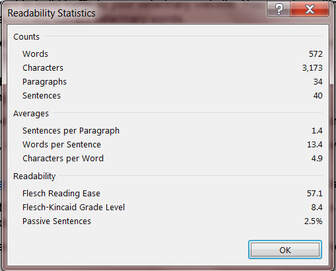|
I recently posted about how to make your veterinary blog easy to read by writing with shorter sentences. Since short ones are easier to follow and digest, they improve readability. Compact writing doesn't mentally tax your blog visitors. On the other hand, slogging through long, winding text does. Readers will lose patience if they struggle to read and understand your writing. Remember, your blogging goal is quality content, so concise communication is vital. The bottom line is that poor readability creates a bad user experience. And bad experiences drive traffic away from your blog. More tips to improve readability Since readability is essential to a positive experience for your audience, what more can you do to improve it? Allow me to make some suggestions …
A helpful online writing assistant/tool that catches problems plaguing writers and suggests corrections. If your writing gets wordy and long, Grammarly recommends revisions to improve clarity and conciseness. (Such as splitting long sentences!)
This test rates how easy text is to read based on a 100-point scale. The higher the score, the easier it is. The calculation formula looks at the average number of syllables per word and words per sentence. The rule of thumb for easy reading is a score between 60 and 70.
As the name implies, this test scores readability by grade level. For example, an 8.0 score means that an eighth grader in the U.S. could understand the text. The recommendation is to score between 7.0 and 8.0. The Flesch Reading Ease Readability tests guide you in determining if your writing is easy to read. And both tests are included in Microsoft Word under the Review tab on the menu. Oh, and one other thing about readability, it can impact your search engine optimization (SEO). Don't lose traffic with those technical veterinary terms pet owners don't knowYou know that Google and other search engines aim to give users the best information.
And we know that through SEO, Google will give users content based on the keywords they're searching with. But what happens if your blog posts or articles don't include those keywords? Suppose you want to build traffic to your veterinary website. You may be writing articles that include many technically correct veterinary words. But if your audience is pet owners, they most likely wouldn't use that technical terminology in their searches. So the search engines wouldn't direct them to your site. And if users did find your site, they probably wouldn't understand those words or the message you're conveying. This situation defeats the purpose of your blog, which is to offer high-value content. To prevent this, explain technical terms in plain English with words that pet owners will likely use. In short, Google doesn't rank content on readability; its algorithms don't calculate this. But it can affect SEO if your language doesn't match the language users are searching with. Or if technical words pepper your text and speak over your audience's head. From the user experience and SEO perspective, we agree that readability is key! Let's talk about that writing project you've put off; email or call me at 508-277-4929! I'm a content writer/consultant and former veterinary assistant specializing in the animal health and veterinary markets. I dive into the intricacies of writing excellent content so you don't have to!
0 Comments
Your comment will be posted after it is approved.
Leave a Reply. |
AuthorSuzanne Quigley - Copywriter Archives
December 2023
Categories
All
|
